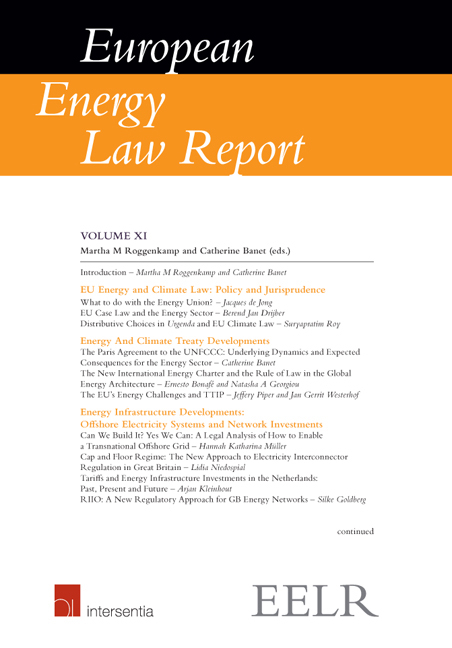Book contents
- Frontmatter
- Editorial
- Contents
- List of Abbreviations
- List of Contributors
- Introduction
- Part I EU Energy and Climate Law: Policy and Jurisprudence
- Part II Energy and Climate Treaty Developments
- Chapter IV The Paris Agreement to the UNFCCC: Underlying Dynamics and Expected Consequences for the Energy Sector
- Chapter V The New International Energy Charter and the Rule of Law in the Global Energy Architecture
- Chapter VI The EU's Energy Challenges and TTIP
- Part III Energy Infrastructure Developments: Offshore Electricity Systems and Network Investments
- Part IV Heat Supply Legislation in the Eu
- Part V Security of Energy Supply and Safety
Chapter V - The New International Energy Charter and the Rule of Law in the Global Energy Architecture
from Part II - Energy and Climate Treaty Developments
Published online by Cambridge University Press: 29 September 2018
- Frontmatter
- Editorial
- Contents
- List of Abbreviations
- List of Contributors
- Introduction
- Part I EU Energy and Climate Law: Policy and Jurisprudence
- Part II Energy and Climate Treaty Developments
- Chapter IV The Paris Agreement to the UNFCCC: Underlying Dynamics and Expected Consequences for the Energy Sector
- Chapter V The New International Energy Charter and the Rule of Law in the Global Energy Architecture
- Chapter VI The EU's Energy Challenges and TTIP
- Part III Energy Infrastructure Developments: Offshore Electricity Systems and Network Investments
- Part IV Heat Supply Legislation in the Eu
- Part V Security of Energy Supply and Safety
Summary
INTRODUCTION
The origins of the Energy Charter Process date back more than two decades when the dissolution of the Soviet Union brought fundamental change in European and world politics. This change opened up new and unprecedented opportunities for economic cooperation, with the energy sector being a focal point of this new relationship. Since then, the energy sector itself has experienced significant changes. One of the latest milestones is the 2015 Paris Agreement of the 21st session of the Conference of the Parties to the United Nations Framework Convention on Climate Change (UNFCCC) (COP21), which brings all nations together in a common cause to undertake ambitious efforts to combat climate change and adapt to its effects (see also Chapter IV in this volume). The question remains whether the framework established in the 1990s in Eurasia is still relevant today and the decades to come in the transition towards a low carbon economy and sustainable energy sector. In these cases the principles of the Energy Charter may be considered universal, from Bogota to Tokyo, as manifested at the Energy Charter Forum in the Colombian capital the same year Japan held the annual chairmanship. Indeed the ‘Tokyo Declaration on the Energy Charter’ on 26 November 2016 validates the fact that the Charter is relevant for all continents.
Whilst new global challenges are being defined, the European Energy Charter was updated as a political declaration in The Hague at the Ministerial Conference on the International Energy Charter (IEC) in May 2015. 4 By August 2017, it had more than 86 signatories from Asia, Africa, Europe and the Americas. The old European Energy Charter of 1991 has been updated by the new IEC, clearly demonstrating that the Energy Charter Process remains instrumental in strengthening global energy security and promoting energy cooperation, and that the modernization efforts are widely embraced.
The above-mentioned Energy Charter Process is to be understood as all activities directed to the correct implementation of the Energy Charter Treaty (ECT or Treaty) rules and IEC principles as well as its geographical expansion across the world. The governing body is the ministerial Energy Charter Conference, which meets once a year and is assisted by a small Secretariat in Brussels. ECT signatories are contracting parties, while IEC signatories are observer members to the Conference.
- Type
- Chapter
- Information
- European Energy Law Report XI , pp. 93 - 120Publisher: IntersentiaPrint publication year: 2017
- 1
- Cited by



